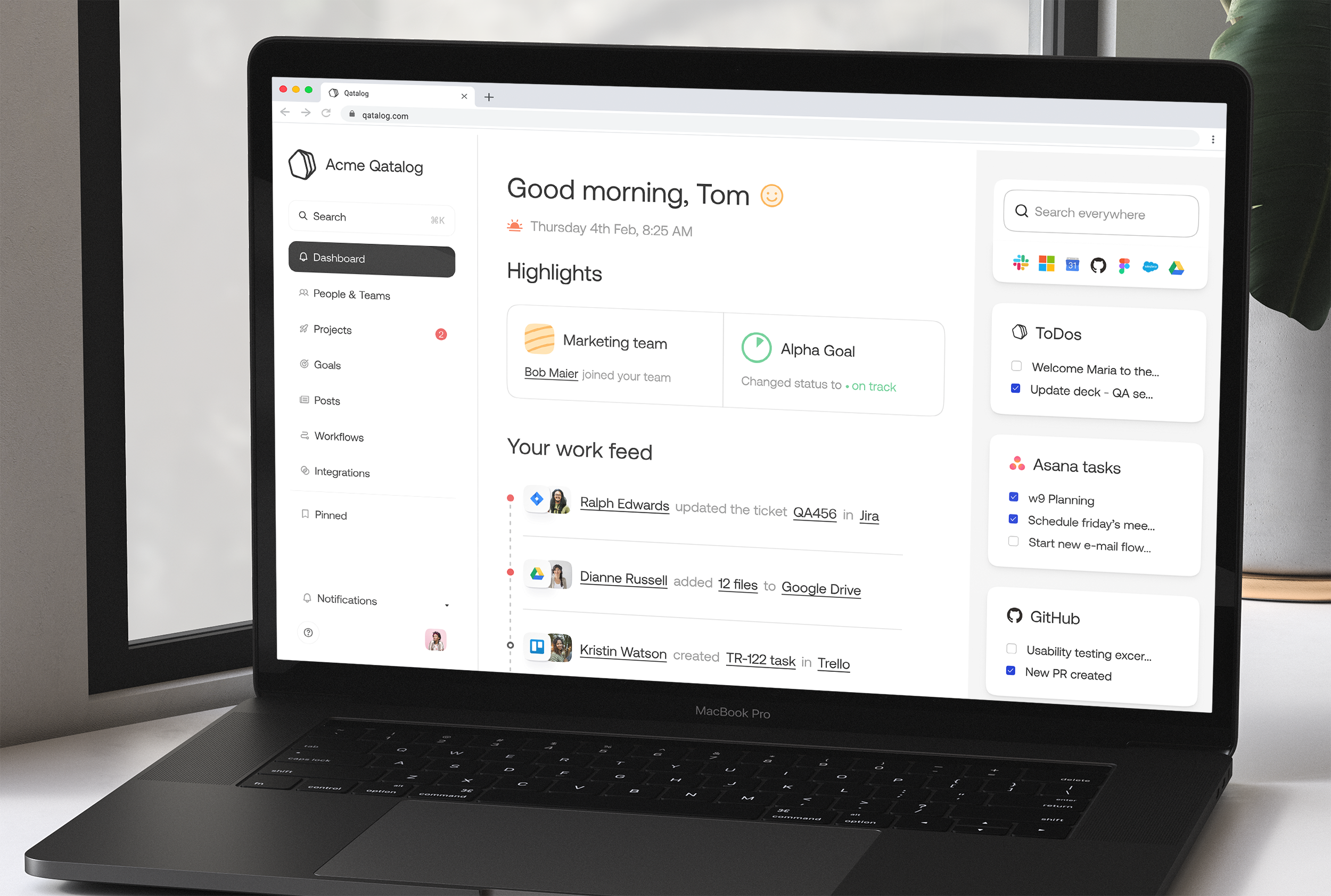‘A wholesale shift in thinking’: Qatalog and the workplace of the future
Former Amazon man Tariq Rauf tells Martin Friel about his quest to streamline office life by pulling together Zoom, Slack, Teams and other key software in one virtual ‘work hub’

The way office work is conducted is changing rapidly as flexible and remote working becomes the norm. We’ve largely completed the logistical shift, employing a range of digital workplace tools – from Zoom and Google Chat to Slack and Teams – to help businesses facilitate that change.
But enforced, en masse remote working has tested the capabilities of these tools to the limit and it feels like something isn’t quite right. They’re not making it easier to engage or find resources and they certainly don’t appear to be making us more productive.
“Zoom Fatigue” rapidly became a thing for millions of people working at home. One survey of over 1,700 managers and employees, conducted by Virtira Consulting, found that 49 per cent experienced a high degree of exhaustion as a direct result of endless video calls.
The survey also found that 63 per cent of remote workers were having more online meetings than they would in the office with 30 per cent regularly spending 2-3 hours a day on video meetings.
These tools have allowed many of us to carry on working in the most extreme circumstances and for that, we should be thankful, but it seems that the quid pro quo of that support is reduced productivity.
Freedom and flexibility are the way to go because supervised working is on the way out
What went wrong? Why hasn’t technology freed us in the way it promised to and what does that mean for the dream of fully flexible working?
“This isn’t a pandemic problem, it’s a modern work problem,” says Tariq Rauf, founder and CEO of Qatalog, a “work hub” that claims to be building the infrastructure of a new way of working.
Put simply, Qatalog is a system that pulls together all the tools employed across a business and presents the information they contain in a way that allows users to access it as and when they want to, rather than having to ask or wait to be updated by a colleague. He describes it as self-service access to information.
But wasn’t that simplification of work what digital tools were supposed to provide in the first place? According to Rauf, it’s not necessarily the tools that are the problem but the working environment in which they operate.
“Companies are trying to move to these new solutions as a way to fix their issues. You can adopt it and use them but there needs to be a wholesale shift in thinking about how people work,” he says.
“They have grafted old-school practices into the new world which doesn’t work anymore. They think using digital tools is going to fix the problem but there is another layer of thinking that needs to happen. Freedom and flexibility are the way to go because supervised working is on the way out.”

That certainly seems to be the trend but the tools that are facilitating this shift are eating into productivity. To illustrate this, Qatalog recently conducted a survey in conjunction with Cornell University’s Ellis Ideas Lab and found that employees are wasting an hour every day searching for information “hidden” in various apps.
And the productivity challenge goes deeper than that with 43 per cent saying they spend too much time switching between apps, 45 per cent believing this switching makes them less productive and 89 per cent feeling that their work life is getting worse.
Hardly the utopic work life we have been encouraged to embrace. But it is exactly these issues that Qatalog was designed to solve.
After training and working as an architect in his native India, Tariq pursued his childhood passion for coding which eventually took him to the UK where he worked at large, fast-growing organisations such as TransferWise and Amazon. It was here that he started to see the problems inherent in merging tech with traditional ways of working.
“TransferWise was growing like a weed with more and more people joining every week and I could see how important access to information and the visibility of information was,” he says.
A lot of office time is unproductive and people only have about four hours of cognitive capacity a day
“Amazon was a much bigger organisation and more complex, but they had the same problems. The old ways of working stuck even after the new tools came in.”
After speaking to other, similar organisations, he was convinced that there was a shared problem to be solved and in 2019, he established Qatalog, initially raising $3.5m (£2.5m)in funding before securing a further $15m a year later.
And it was his background in architecture that influenced his approach to building the latest in a long line of digital workplace tools.
“When you are designing a building, you can’t just stack rooms on top of each other and make it work. You have to be thoughtful about how the building and people work together,’ he says.
What he imagines is a workplace where everyone takes responsibility for their own understanding of what is going on in a business and where it is simple to source information in terms of people, teams and projects.
“Take any company apart and those are the key things, regardless of size. In terms of accessing the information that individual people have, a lot of that is gained through informal networks but if you are a 5,000-people organisation, you only see your team. Everything else is hidden away,” he says.
It is the same for projects and teams: “You know what’s happening locally, in your team, but if you want any information about what is happening more broadly across the organisation or in other projects, you need updates and meetings. Someone has to give you that information.”
And it is that inherent inefficiency in the traditional way of working, compounded and confused by the use of multiple digital tools, that Rauf believes Qatalog can remove.

“One aspect of this new way of working that can help is that it lets people focus,” he says.
“A lot of the time in the office is unproductive and people only have about four hours of cognitive capacity a day. So, if you spend that navigating all the things that come with modern work how much that cognitive capacity are you using on actual work?”
He believes that if people are given clear problem statements, have clear alignment and are given two to three hours where they can focus, it will do wonders for productivity both at an individual business level and across economies.
“Unlike with industrial revolution where more hours meant more goods, we don’t have that in a knowledge-based economy. More emails don’t mean more output – it’s the opposite,” he says.
These are not new issues, but Rauf believes they will become seismic in a remote working world. But with a different approach to the way we work and a willingness to completely rethink it, he believes that not only can we make working life more enjoyable, we can become more productive in the process.
“There are 1.2 billion knowledge workers in the world today and they are responsible for most of the growth in the world. If we gave each of them a couple of hours back a day and allowed them to focus, just imagine what that would mean for their work life and for society at large.”






Join our commenting forum
Join thought-provoking conversations, follow other Independent readers and see their replies
Comments